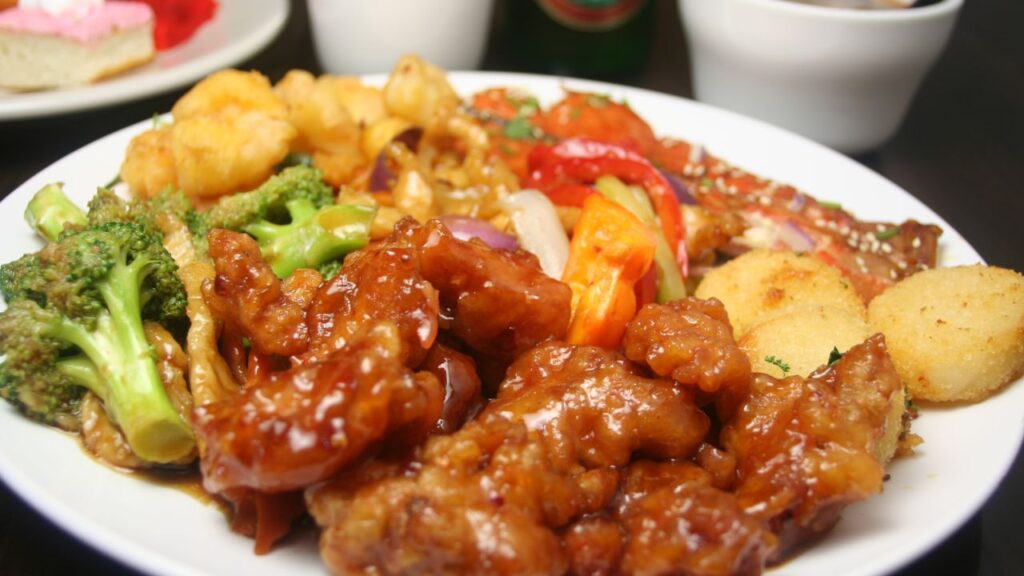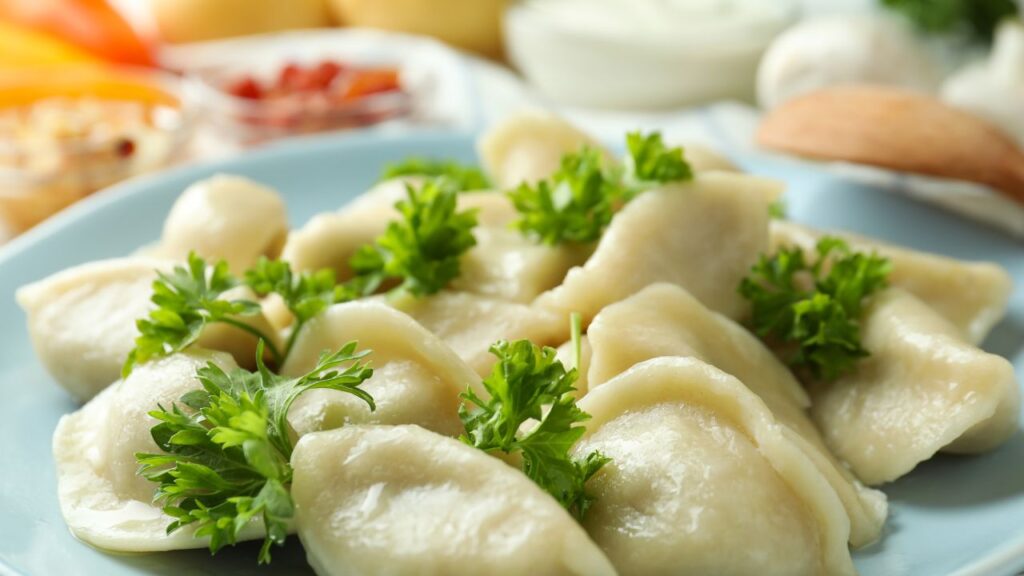Chinese cuisine is renowned worldwide for its diverse flavors, tantalizing aromas, and rich culinary history. From the fiery Sichuan dishes to the subtle elegance of Cantonese cuisine, Chinese food offers a vast range of options that cater to every palate. However, for some people, indulging in this delicious fare can lead to an unpleasant experience characterized by stomachaches, nausea, or even food poisoning.
If you’ve ever wondered, “Why does Chinese food make me sick?” this article is here to explore the possible reasons behind this phenomenon and provide you with tips to enjoy Chinese cuisine without any digestive distress.

Food Allergies and Sensitivities
One of the primary reasons some individuals experience discomfort after eating Chinese food is food allergies or sensitivities. Several Chinese dishes contain common allergens like peanuts, soy, shellfish, and gluten.
People who are allergic or sensitive to these ingredients can experience a range of symptoms, including hives, difficulty breathing, nausea, and diarrhea. If you suspect food allergies, consult with an allergist to identify specific triggers and develop a personalized dietary plan.
Monosodium Glutamate (MSG)
Monosodium Glutamate (MSG) is a flavor-enhancing additive frequently used in Chinese cuisine. While MSG is most often recognized as safe by regulatory authorities like the FDA, some individuals may experience a condition known as “Chinese Restaurant Syndrome” after consuming it.
Symptoms of this syndrome may include headaches, sweating, chest pain, and gastrointestinal discomfort. However, it’s essential to note that scientific research has not consistently supported the idea that MSG is a widespread cause of these symptoms.
Unfamiliar Ingredients and Cooking Techniques
Chinese cuisine boasts a plethora of exotic ingredients and cooking techniques that differ from what many Western palates are accustomed to. From century eggs to stinky tofu, these novel flavors can sometimes upset sensitive stomachs.
Additionally, Chinese cooking methods like stir-frying, deep-frying, and steaming can alter the texture and composition of ingredients, making them harder to digest for some individuals.
High-Fat and High-Sodium Dishes

Some Chinese dishes are notorious for their high-fat and high-sodium content, which can lead to digestive issues when consumed in excess. Fried rice, sweet and sour pork, and General Tso’s chicken are examples of dishes that often contain copious amounts of oil and sodium.
Overindulgence in these rich and salty options can trigger bloating, water retention, and digestive discomfort.
Cross-Contamination
Cross-contamination is a common issue in restaurants that serve both Chinese and non-Chinese cuisines. For individuals with food allergies or sensitivities, the risk of exposure to allergens can be significantly increased if kitchen staff do not take proper precautions to prevent cross-contamination.
Always inform your server of your dietary restrictions and ask about kitchen practices if you have concerns.
Improper Food Handling and Hygiene
Foodborne illnesses can occur if Chinese restaurants do not follow proper food handling and hygiene practices. Raw ingredients, especially seafood, must be stored, handled, and cooked with care to prevent bacterial contamination.
If you suspect food poisoning from a Chinese restaurant, report it to the local health department and immediately seek medical attention if your symptoms are severe.
Spices and Heat Levels

Chinese cuisine often incorporates a wide range of spices and heat levels, from mild to extremely spicy. For those not accustomed to the intense heat of dishes like Sichuan hot pot or Mapo tofu, digestive discomfort can be a common side effect. Gradually increasing your tolerance for spiciness can help you enjoy these dishes without digestive issues.
You’ll Also Like: How Much Is A Quart Of Chinese Food?
Excessive MSG Usage
While MSG is generally considered safe for most people, excessive use of this flavor enhancer can lead to an adverse reaction in few individuals. Chinese restaurants vary in their MSG usage, so if you’re sensitive to MSG or prefer to avoid it, inquire about its presence in the dishes you plan to order and choose restaurants that cater to your preferences.
Portion Sizes and Overeating
Chinese restaurants are often generous with portion sizes, making it easy to overindulge. Overeating, in general, can lead to digestive discomfort, regardless of the cuisine. To avoid this, share dishes with dining companions, request smaller portions, or take leftovers home for another meal.
Individual Sensitivities
Ultimately, individual factors play a significant role in how your body responds to Chinese food. Everyone’s digestive system is unique, and what causes discomfort in one person may not affect another. Pay attention to your body’s signals and identify specific dishes or ingredients that consistently lead to discomfort.
Digestive Differences and Cultural Variations
Chinese cuisine is deeply rooted in its cultural traditions, and what might be easily digestible for someone raised in this cuisine may not be the case for someone from a different culinary background. Chinese food often includes a variety of textures, flavors, and ingredients that may be unfamiliar to Western palates.
These differences can influence how our digestive systems react to the food. So, it’s not just about the food; it’s also about the cultural context in which it’s consumed.
The Role of Food Preparation Techniques
Chinese cooking methods are diverse and include stir-frying, steaming, boiling, and more. The way a dish is prepared can have a significant impact on its digestibility.
For example, deep-frying can make foods oily and heavy, while steaming retains the natural flavors and nutrients. Understanding these cooking techniques can help you choose dishes that are easier on your stomach.
Regional Variations in Chinese Cuisine

China is a vast country with diverse culinary traditions across its regions. From the spice-heavy dishes of Sichuan to the light and delicate flavors of Cantonese cuisine, regional differences can play a role in how Chinese food affects your digestion.
If you’ve had a negative experience with one style of Chinese cuisine, consider trying another that might be more compatible with your palate and digestive system.
Balancing Yin and Yang in Chinese Cooking
Traditional Chinese medicine holds great importance on the balance of yin and yang in food. Some Chinese dishes are considered “yang” (warming), while others are “yin” (cooling).
Imbalances in this balance can lead to discomfort or illness in those not accustomed to it. Understanding these principles can help you select dishes that align better with your body’s needs.
The Importance of Mindful Eating
Digestive discomfort can sometimes result from eating too quickly or not paying attention to your body’s signals. Chinese dining often emphasizes the social aspect of sharing dishes, which can lead to overeating if you’re not mindful.
Take your time to savor each bite, listen to your body’s cues of fullness, and enjoy the experience of dining, which is an integral part of Chinese cuisine.
The Importance of Food Quality and Sourcing
The quality of ingredients used in Chinese cuisine can vary greatly depending on the restaurant or establishment. In some cases, lower-quality or improperly stored ingredients can lead to digestive issues.
Choosing restaurants that prioritize fresh, high-quality ingredients can significantly reduce the likelihood of experiencing discomfort. It’s often worth paying a bit more for a dining experience that values food sourcing and quality.
The Role of Herbal Remedies and Digestive Aids
Traditional Chinese medicine offers a wide array of herbal remedies and digestive aids that can help alleviate discomfort. Many Chinese herbal teas, such as ginger or mint, are known for their soothing effects on the stomach. Talk to a traditional Chinese medicine practitioner to explore herbal remedies that may be suitable for your digestive needs.
Finding a Balance: Adaptation and Enjoyment
Ultimately, the key to enjoying Chinese food without discomfort lies in finding a balance between adaptation and enjoyment. If you are not accustomed to the flavors and ingredients of Chinese cuisine, it may take time for your palate and digestive system to adjust.
Start with milder dishes and gradually explore more complex flavors. Over time, you’ll likely find that your tolerance for and appreciation of Chinese food will grow, allowing you to indulge in this delightful cuisine without digestive distress.
You’ll Also Like: What is Golden Finger Chinese Food?
Our Take
Chinese food is a culinary treasure trove filled with flavors, textures, and cultural significance. While it’s true that some individuals may experience digestive discomfort after indulging in this cuisine, it’s essential to remember that various factors, such as food allergies, sensitivities, and dietary choices, can influence these reactions. By understanding the causes and taking preventive measures, you can savor the delights of Chinese cuisine without fear of getting sick.
So, the next time you ask yourself, “Why does Chinese food make me sick?” you’ll be armed with the knowledge to make informed choices and enjoy your meal to the fullest.
Frequently Asked Questions
- Is Chinese food more likely to cause digestive discomfort than other cuisines?
Not necessarily. Digestive discomfort can result from various factors, including individual sensitivities and food choices, regardless of the cuisine. Chinese food offers a wide range of dishes, and your experience may vary depending on what you choose to eat.
- What is MSG, and does it always cause discomfort?
MSG is a flavor enhancer commonly used in Chinese cuisine. While some people report adverse reactions to MSG, scientific research has not consistently supported this. MSG is generally safe, but individuals with sensitivities may experience discomfort in some cases.
- How can I avoid allergic reactions when dining at Chinese restaurants?
To avoid allergic reactions, inform your server of your allergies and ask about ingredients in specific dishes. Be cautious of cross-contamination, as some restaurants serve both allergen-containing and allergen-free dishes.
- Can I enjoy Chinese food if I have a gluten intolerance?
Yes, many Chinese dishes can be made gluten-free, but it’s crucial to communicate your dietary needs to the restaurant staff. Rice-based dishes and gluten-free soy sauce can be suitable alternatives for those with gluten intolerance.
- Are there any traditional Chinese remedies for digestive discomfort?
Traditional Chinese medicine offers various herbal remedies and teas that are believed to soothe digestive issues. Ginger and mint teas, for example, are commonly used to ease stomach discomfort.
- Is it safe to eat street food in China without risking digestive problems?
While street food can be yummy, it can also pose a higher risk of foodborne illness if not prepared and handled properly. Choose street vendors with a good reputation, observe their hygiene practices, and opt for freshly cooked items.
- What are some tips for avoiding overeating when dining at Chinese restaurants?
To avoid overeating, consider sharing dishes with dining companions, ordering smaller portions, or taking leftovers home. It’s also helpful to eat slowly, enjoy each bite, and listen to your body’s signals of fullness.
- How can I identify authentic Chinese restaurants that prioritize food quality and safety?
Look for restaurants that prioritize fresh ingredients, have good reviews, and are known for their commitment to food quality and safety. Authentic Chinese restaurants often have a dedicated following in their local communities.
- Can I enjoy Chinese food even if I’m not accustomed to its flavors and ingredients?
Yes, you can. Start with milder dishes and gradually explore more complex flavors. Chinese cuisine offers a diverse range of options, so you’re likely to find dishes that suit your palate and digestive system as you gain experience.

At Bridge House Tavern, we’re more than a team of food enthusiasts; we’re a culinary journey waiting to be savored. Our five-member crew is on a relentless quest to explore, create, and share the wonders of the gastronomic world.



